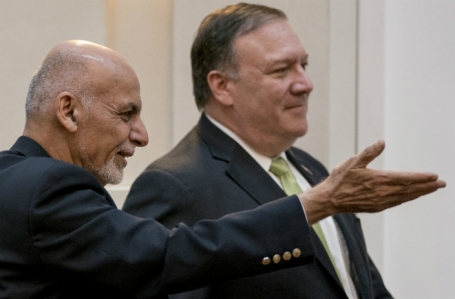
The US Secretary of State Michael R. Pompeo spoke with Afghanistan’s President Ashraf Ghani on Thursday and discussed the September 28 elections, according to a US State Dept. spokesperson.
Ghani tweeted about the conversation late Thursday night, saying:
“Pleased to have received a phone call from secretary Pompeo. We discussed elections over the weekend. And to ensure security for a big turn out. I expressed our gratitude for the United States' assistance in blood and treasure and reiterated our partnership for a stable #AFG.”
The US State Department’s summary of the call was more pointed:
“Secretary Michael R. Pompeo spoke with Afghanistan’s President Ghani today to underscore the United States’ expectation that the conduct of candidates and government institutions holding the Afghanistan election should be beyond reproach to ensure the legitimacy of the outcome.”
This comes as US Ambassador John Bass, also on Thursday, called out President Ashraf Ghani for neglecting to acknowledge US assistance, particularly USAID programs, during an interview the president gave with Radio Azadi, aired on Thursday evening.
“We are disappointed that President Ashraf Ghani has overlooked the excellent work of USAID and the details of our enduring partnership to improve the lives of Afghans throughout the country.”
The ambassador went on to tweet several photos calling attention to US programs, such as training for midwives and building up infrastructure in the energy sector.
Earlier in September both Secretary Pompeo and Ambassador Bass indirectly pressured Ghani during a widespread electricity shortage with a tweet by Bass calling out the National Procurement Authority for holding up approval of fuel contracts, followed by a shocking statement by Pompeo that the US would be withholding over $160 million in aid because of concerns about corruption in the Afghan government, referencing the NPA.
President Ghani has direct oversight of the NPA and, as a former finance minister, is intimately involved with the policies for approving and denying contracts, policies which have attracted deeper media scrutiny since Bass and Pompeo got involved.
Emboldened whistleblowers, such as Minister of Economy Dr. Mustafa Mastoor, have since publicly alleged that the mechanism for disbursing funds—or not disbursing funds—shunts large amount of money into slush funds with little or no transparency.
Ghani has publicly rejected these claims, stating that his policies regarding contracts saves money for Afghans by denying access to corrupt contractors.
But the current issue is about transparent elections, which, like the financial affairs of the nation, is fraught with allegations of foul play. For example, on Thursday Tolonews reported allegations of provincial governors in Daikundi, Paktia and other provinces being paid to support certain presidential campaigns—even in some instances to produce specific numbers of votes.
Afghan responses to US public leveraging of Ghani have been mixed, with some saying that the US should have publicly pressured the Afghan government sooner in its post-9/11 intervention, while others resent a lack of respect for Afghan sovereignty.
A young Afghan (judging by his profile), replied to Ashraf Ghani on twitter:
Dear President, today the us embassy directly interfered in our Internal affairs.
It is against all diplomatic rules.
We are independent country not under control of any country.
It is really shameful we are waiting for your action...



